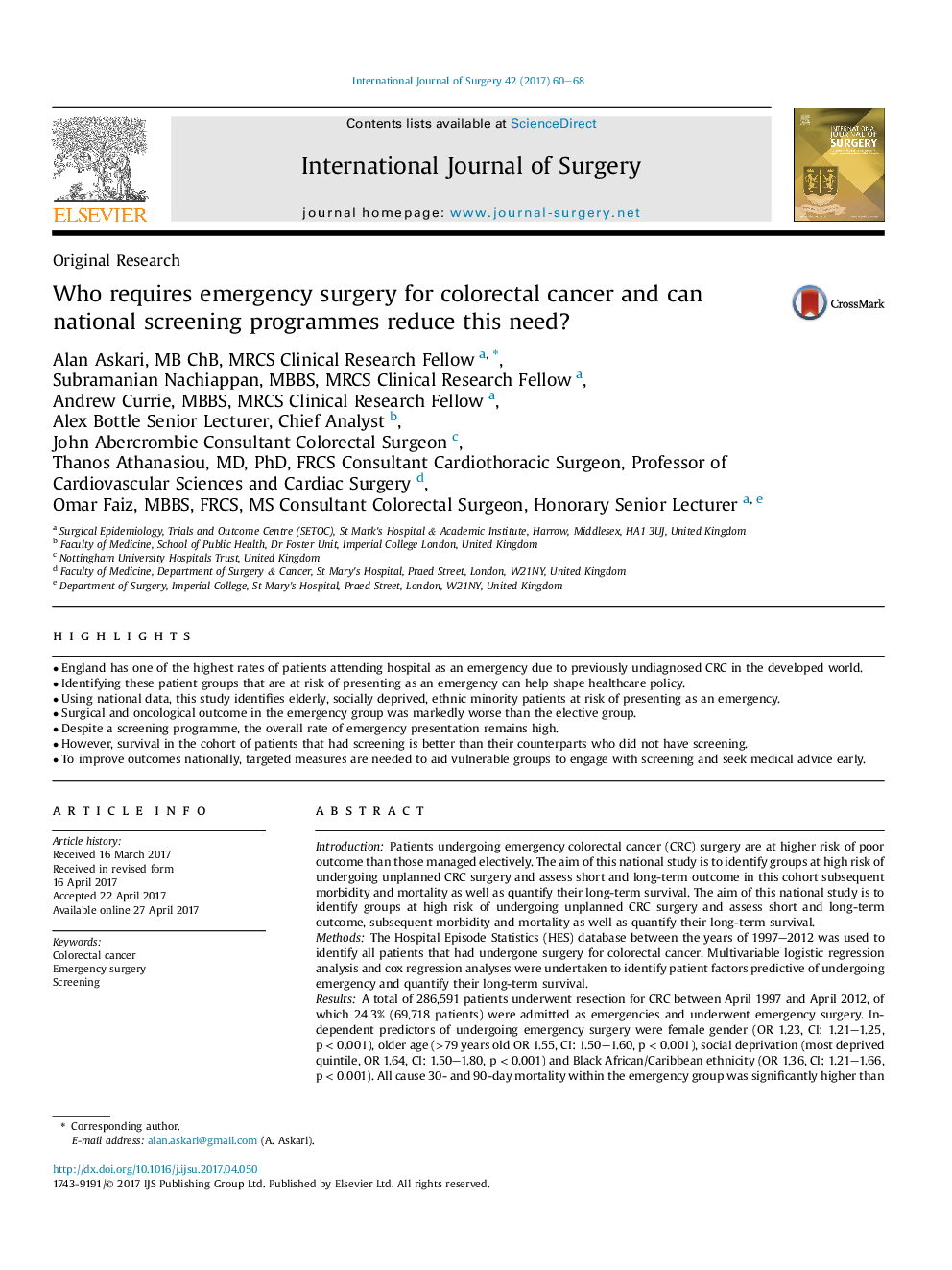| کد مقاله | کد نشریه | سال انتشار | مقاله انگلیسی | نسخه تمام متن |
|---|---|---|---|---|
| 5731735 | 1611936 | 2017 | 9 صفحه PDF | دانلود رایگان |
- England has one of the highest rates of patients attending hospital as an emergency due to previously undiagnosed CRC in the developed world.
- Identifying these patient groups that are at risk of presenting as an emergency can help shape healthcare policy.
- Using national data, this study identifies elderly, socially deprived, ethnic minority patients at risk of presenting as an emergency.
- Surgical and oncological outcome in the emergency group was markedly worse than the elective group.
- Despite a screening programme, the overall rate of emergency presentation remains high.
- However, survival in the cohort of patients that had screening is better than their counterparts who did not have screening.
- To improve outcomes nationally, targeted measures are needed to aid vulnerable groups to engage with screening and seek medical advice early.
IntroductionPatients undergoing emergency colorectal cancer (CRC) surgery are at higher risk of poor outcome than those managed electively. The aim of this national study is to identify groups at high risk of undergoing unplanned CRC surgery and assess short and long-term outcome in this cohort subsequent morbidity and mortality as well as quantify their long-term survival. The aim of this national study is to identify groups at high risk of undergoing unplanned CRC surgery and assess short and long-term outcome, subsequent morbidity and mortality as well as quantify their long-term survival.MethodsThe Hospital Episode Statistics (HES) database between the years of 1997-2012 was used to identify all patients that had undergone surgery for colorectal cancer. Multivariable logistic regression analysis and cox regression analyses were undertaken to identify patient factors predictive of undergoing emergency and quantify their long-term survival.ResultsA total of 286,591 patients underwent resection for CRC between April 1997 and April 2012, of which 24.3% (69,718 patients) were admitted as emergencies and underwent emergency surgery. Independent predictors of undergoing emergency surgery were female gender (OR 1.23, CI: 1.21-1.25, p < 0.001), older age (>79 years old OR 1.55, CI: 1.50-1.60, p < 0.001), social deprivation (most deprived quintile, OR 1.64, CI: 1.50-1.80, p < 0.001) and Black African/Caribbean ethnicity (OR 1.36, CI: 1.21-1.66, p < 0.001). All cause 30- and 90-day mortality within the emergency group was significantly higher than that for the electively managed patients group (13.3% versus compared with 3.4% at 30-days) as was 90-day (20.0% versus compared with 5.8% at 90-days). Amongst patients eligible for bowel screening there was an approximate 40% significant reduction in the proportion of patients requiring emergency surgery before and after its introduction in 2006 (23.4%-14.9%, p < 0.001). This reduction in emergency surgery included both proximal and distal cancer resections.ConclusionOlder, socially deprived and ethnic minority patients with colorectal cancer are more likely to present as emergencies requiring CRC surgery. Public health initiatives, such as bowel cancer screening, appear to have concomitantly reduced emergency and increased elective surgical rates within the eligible cohort. This is likely to have a beneficial impact on population survival. Strategies aimed at preventing emergency presentation by identifying patients at specific risk could improve survival outcome for colorectal cancer surgery in England.
Journal: International Journal of Surgery - Volume 42, June 2017, Pages 60-68
